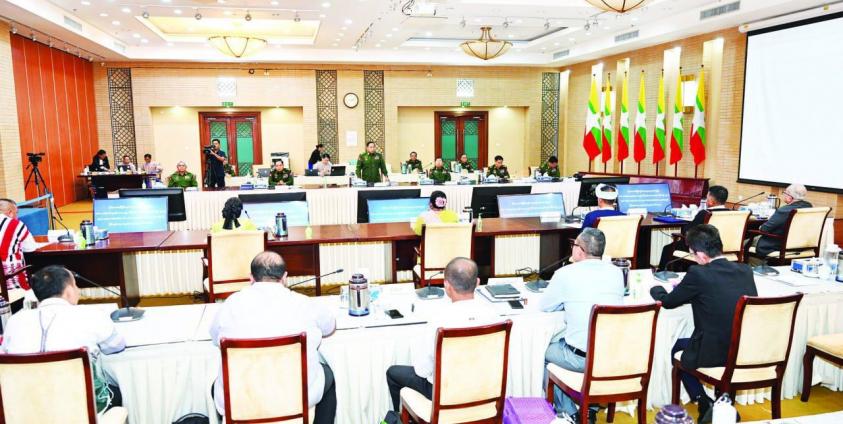Daw Saw Mra Razar Lin, spokesperson for the five NCA-Signatory EAOs, stated that the Nationwide Ceasefire Agreement (NCA) is an agreement approved by the Pyidaungsu Hluttaw and remains valid without any nullification.
She addressed a press conference following the peace talks that took place in Nay Pyi Taw between the National Solidarity and Peacemaking Negotiation Committee (NSPNC) of the Military Council and five NCA-signatory Ethnic Armed Organizations (EAOs) from August 29 to 31.
Daw Saw Mra Razar Lin emphasized that the NCA holds significant importance for the entire ethnic community and that national-level political discussions have been conducted in accordance with the provisions of this agreement.
Hence, the Ethnic Armed Organizations (EAOs) that have signed the NCA will continue to implement it and engage in peaceful negotiations in order to establish a democratic and federal state, she said.
"Rather than declaring the agreement as invalid or obsolete, we should work towards reinforcing and revitalizing it. If there are weaknesses, our focus should be on strengthening them. Everything has its strengths and weaknesses, and we can address these shortcomings through amendments. Even the constitution can be amended, and we should strive to make those changes. Despite the absence of a parliament at the moment, the path of dialogue must remain intact. Our primary goal should be to reestablish the path of discussion, ensuring that the fundamental principles and essence of the NCA are not abandoned," emphasized Daw Saw Mra Razar Lin.
When the NCA was signed by two successive democratic governments, it involved the participation of the President, two Vice Presidents, the military's Commander-in-Chief of Defense Services, the Deputy Commander-in-Chief of Defense Services, representatives of Ethnic Armed Organizations (EAOs), as well as local and international witnesses.
However, the Karen National Union (KNU), a well-established ethnic armed organization that signed the NCA, has expressed that the principles laid out in chapter (1) of the agreement have been trampled upon and destroyed by the Military Council. Consequently, KNU said that the NCA has lost its validity, and there is no rationale for its continued adherence.
Presently, the Karen National Union (KNU), Chin National Front (CNF), and All Burma Students' Democratic Front (ABSDF) have withdrawn their support for the NCA as a result of the military coup and the halted discussions with the Military Council.
"Whether due to their geopolitical circumstances or their relative strength, they chose to remain within the NCA as organizations unable to make political advancements. The Military Council also viewed this as a symbol of EAOs aligning with them and adhering to the NCA's framework. In this way, the meetings will consistently occur. Discussions that overlap with topics like federalism have essentially led to no significant implementations within the context of the NCA," commented veteran politician U Pe Than.
The five NCA-signatory EAOs declared that during their three-day meeting, they deliberated on the amendments to the 2008 Constitution proposed by the Military Council, matters concerning elections, and the delivery of humanitarian assistance in the EAO region.
Furthermore, the five NCA-signatory EAOs presented issues about securing humanitarian aid, involving representatives of NCA-signatory EAOs in coordination with international organizations, and practically participating in the establishment of a federal union.
After discussions with the military council, leaders from both sides were able to confirm and sign four foundational agreements and five common agreements to be implemented in the future.
The five NCA-signatory EAOs that engaged in peace discussions with the Military Council are the Arakan Liberation Party (ALP), Democratic Karen Benevolent Army (DKBA), Karen Peace Council (KNU/KNLA-PC), Lahu Democratic Union (LDU), and Pa-O National Liberation Organization (PNLO).







